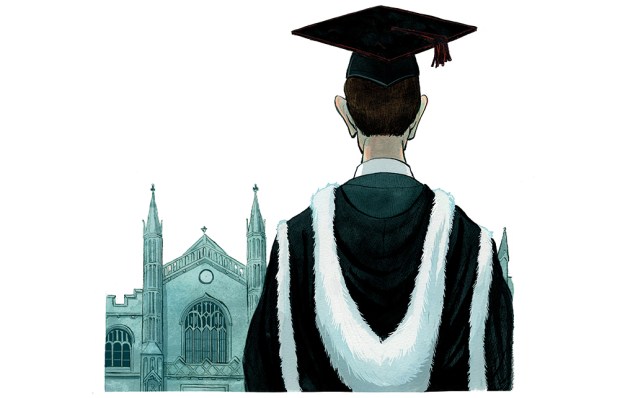On the face of it, this year’s Nobel Prize awards have been a triumph for British scientists. No fewer than five laureates come from these shores: three physicists, one chemist and an economist. But before anyone starts praising our higher education system, there is one small snag: all five are currently working at US universities.
David Thouless, who was awarded half the Physics prize, has followed a typical career path. After taking a degree at Cambridge, he took a PhD at Cornell University and a postdoc at the University of California before heading back to Britain, where he worked for 13 years at the University of Birmingham. There, he started the work that would eventually win him his Nobel prize. But it might not have happened if he had not taken up an appointment as professor of physics at the University of Washington in Seattle, where his work was far better funded.
Plenty of Nobel prizes have been won at British universities, but there is a very definite direction of travel for ambitious British academics: across the Atlantic, where the pay is far better and the facilities superior to those in Britain. American universities lead the world because the best of them tend to be private — and meritocratic in nature. Their success puts Britain’s publicly owned universities to shame. They are wealthy because they ask those who can afford it to pay the real cost of the tuition — while making sure that those who can’t afford it are subsidised. It is easier for the children of the poor to study at Yale than at Oxford, because Yale’s fees are means tested and funded through scholarships rather than loans.
British higher education, by comparison, seems increasingly to be run as a branch of the welfare state. Admission to our top universities is now governed by an absurd quango called the Office for Fair Access, which treats universities as if they are all guilty of an institutional bias. The worst of this was David Cameron’s entirely false claim that a black teenager is more likely to go prison than to a top university. How much easier it is to blame universities than confront the deep seated problems in the state school system.
Cameron’s coalition did inject more money into universities by allowing them to increase tuition fees to £9,000 a year. This turned out to be a great success because universities were given the freedom to use some of the money to encourage poorer but academically able students to apply. Today, a record number of students from deprived backgrounds are applying to university (and being accepted) — in England, at least. In Scotland, poor students are half as likely to get into university, because the SNP has refused to introduce tuition fees. The English experiment underlines the lesson from America: giving universities more financial freedom leads to more progressive results.
Yet it seems that Theresa May is keen to continue meddling. She has said she’d grant universities greater freedom over tuition fees only if they agreed to sponsor under performing state schools. This is a daft idea, as well as an insult to good schoolteachers. A university that is effective at teaching a select group of young adults to degree level is not automatically equipped to take over teaching at a high school. Put an Oxbridge don in a class of 13 year olds at an underperforming comprehensive and the result is more likely to be Grange Hill than Educating Rita.
Mrs May could more profitably focus on how best to help Britain’s world class universities compete with their rivals in an international competition for the best brains. Why should it be that the most successful British academics can double their salary by heading to America? Shanghai Ranking, now the most trusted world league table, shows that the United States has 50 of the world’s top 100 universities. Britain is next, but with only eight (Oxford, Cambridge, UCL, Imperial, Manchester, Edinburgh, Bristol and King’s College London). And even these eight will struggle to retain their best talent and their reputations unless they can evolve in the same way as modern American universities.
The government’s crackdown on the number of overseas students entering Britain is equally disturbing. For the purpose of helping the Home Office reach its arbitrary (and unreachable) net immigration target of a few tens of thousands a year, PhD students have been lumped in with potato pickers and potential benefit claimants on the list of undesirables. In what way are overseas students a burden? Yes they may be coming to Britain, but education is in reality one of our greatest exports. We sell it abroad and generate income from fees, which are much higher for international students.
Britain’s best universities ought to be rapidly expanding, and they should be free to sell their expertise in a global marketplace. They have done remarkably well considering the burden placed upon them by politicians. But if we want these institutions to thrive in future the government is going to have to stand back: allow them to set a realistic price for the education they offer, do away with caps such as the one on the number of medical students they can accept, and let them throw open their doors, unhindered, to the rest of the world.
The post Universities challenged appeared first on The Spectator.
Got something to add? Join the discussion and comment below.
Get 10 issues for just $10
Subscribe to The Spectator Australia today for the next 10 magazine issues, plus full online access, for just $10.
You might disagree with half of it, but you’ll enjoy reading all of it. Try your first month for free, then just $2 a week for the remainder of your first year.













Comments
Don't miss out
Join the conversation with other Spectator Australia readers. Subscribe to leave a comment.
SUBSCRIBEAlready a subscriber? Log in